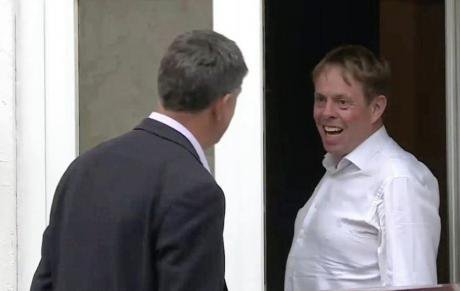
Richard Cook, chair of the secretive group that channelled £435,000 to the DUP, is interviewed at his home by Channel 4's Alex Thomson. Image used under Fair Use: Channel 4. All rights reserved.
A number of major political donors have denied they are the source of a controversial £435,000 donation to the DUP’s Brexit campaign, openDemocracy can reveal today – with only one person refusing to distance themself from the secret donation.
openDemocracy has investigated a list of key figures in relation to the donation, and all apart from one have either denied involvement or have made public statements indicating opposition to Brexit. The only person we contacted who has told us he will not comment is Henry Angest, a banker and longstanding Conservative party donor, who is known to be a supporter of Brexit.
Continuing secrecy raises pressing questions about transparency in UK politics.
There is no evidence to suggest that Angest, nor any of the other figures we have contacted, are the source of the £435,000. Nor is there any suggestion that whoever gave this unprecedented sum to the DUP’s Leave campaign broke any laws.
But the continuing secrecy raises pressing questions about transparency in UK politics – particularly as Northern Ireland’s Democratic Unionist Party now holds the balance of power in parliament, propping up Theresa May’s minority government as it negotiates Brexit.
The UK government announced earlier this year that it will change the law to end donor secrecy in Northern Ireland, but has rejected calls to backdate the law to 2014, so that the source of the DUP donation could be revealed. Government and DUP sources have rejected accusations that this is ‘protection’ for the DUP, as part of their £1 billion deal to keep the Conservatives in power.
One consistent clue
Northern Ireland's Democratic Unionist Party (DUP) has repeatedly refused to reveal the source of the cash, which was spent on lavish pro-Leave campaigning in the weeks before Brexit. But we have consistently been given one clue as to where the money came from: that those behind the donation are passionate supporters of the Union between the four nations of the UK.
After openDemocracy first revealed the scale of the secret donation, DUP leader Arlene Foster was grilled about it on the BBC Northern Ireland show ‘The View’. She said that the money came from “an organisation in England that wants to see the Union kept". Later that month, under continued pressure, her party disclosed that the money came from “pro-Union business people”, via a little-known group called the Constitutional Research Council (CRC). Glasgow-based Richard Cook, who chairs the CRC, has claimed that the group was set up to promote the Union, and has also revealed that Scottish people are among the donors.
openDemocracy has since investigated every major political donor who fits this profile. In particular, we contacted everyone who gave £25,000 or more to oppose independence in the run-up to the 2014 Scottish referendum, and asked each donor from that group (apart from those already on record as Remain supporters) if they were the source of the DUP donation.
The findings of our investigation are below.
Ruling out Remainers

‘Vote to Leave the EU’. Flickr/David Holt. CC-by-2.0.
In February, we discovered that the £435,000 had been channelled to the DUP via a little-known group, the Constitutional Research Council (CRC). The DUP Brexit campaign manager Jeffrey Donaldson MP has described the CRC as "a group which supports constitutional pro-Union causes". He added: "they believed, as did we, that Brexit would be good for the Union and bad for those who oppose it.”
Our first step was to eliminate from our enquiries all the pro-Union donors who have also – vocally or financially – supported the Remain campaign. These include Harry Potter author JK Rowling, who gave a million pounds to the pro-Union Scottish campaign, Better Together, and has also spoken repeatedly in public about her support for EU membership. Donald Houston, whose firm Raindance Investments Ltd gave £200,000 to the pro-Union campaign in 2014, also contributed to the Remain campaign. The billionaire banker Bruno Schroder made significant donations to Better Together, the Remain campaign, and the Kensington Conservative party.
Ian Taylor's company Vitol, the world's largest oil trader, was fined $7 million in 2007 for paying $13 million in kickbacks to Iraqi officials during the Saddam Hussein era. Taylor is also the majority shareholder in Harris Tweed Hebrides and chairman of the board of the Royal Opera House. He was a major donor to Better Together before the Scottish independence referendum, and also to the Remain campaign in 2016.
Orion Engineering is also an important player in Scotland’s oil industry, led by Alan Savage. The firm, which specialises in recruitment, gave £50,000 to Better Together ahead of the Scottish referendum. The firm has not responded to our attempts to contact Savage, but given that the firm has also supported the Liberal Democrats (opponents of Brexit), and in 2015 Savage wrote that "being part of the European Union is fundamental to my business", and that "leaving the EU is a completely absurd idea", we have ruled him out of our enquiries.
“Mr Sansom knows nothing about this shower”
Next, there were those pro-Union donors who told us that they supported the Remain campaign, or vocally distanced themselves from the DUP deal.
Author Christopher Sansom is reported on the Electoral Commission website as having given £200,000 to Better Together (though The Scotsman has previously put the figure at £294,000). Speaking to openDemocracy via his agent, he confirmed that he “knows nothing about this shower”, and was a Remain supporter.
Conservative peer Andrew Fraser is reported on the Electoral Commission website as having given £100,000 to Better Together of which he was treasurer, and also gave £20,000 to the “Let’s Stay Together” campaign (again, this number has been reported in the Scotsman as being higher). He was ennobled in David Cameron’s resignation honours, and, when asked by openDemocracy if he supported a Remain vote said, “I certainly did”.
The Scottish businessman Alan McFarlane, who is chairman of the advisory board of the think tank “Reform Scotland” and founder and senior partner of Edinburgh based investment management company Dundas Partners LLP, gave £20,000 to the Unionist “Vote No Borders” campaign, and also £10,000 to the “WSF2014 Ltd” pro-union campaign. Asked about the Constitutional Research Council, he told openDemocracy “I know nothing about them”, and sources confirmed that he was a Remain supporter.
Angus MacDonald, who made his fortune in the financial information industry and now works in recycling in Scotland, ran his own pro-Union campaign in 2014. He confirmed that he had “no idea about any of this”. The Constitutional Research Council chair Richard Cook also works in the waste management industry in Scotland, but MacDonald said he had “never heard of Richard Cook.”
The Earl of Seafield is the chieftain of Clan Grant and one of Scotland's biggest landowners. It was the previous Earl of Seafield who, as Scotland's Chancellor, signed the Act of the Union in 1707, famously saying, "there’s ane end of ane auld sang". The current Earl made a donation of £100,000 under the name "Sir Ian Seafield" to the Better Together campaign, while his Reidhaven Trust Estate Ltd made a further donation of £20,000. Asked about the DUP donation, his spokesperson confirmed that “Lord Seafield does indeed know nothing about this”.
Banker Ivor Dunbar, former co-head of global capital markets at Deutsche Bank, gave £50,000 to Better Together in 2012. Dunbar is chairman of the Scottish based gap-year charity Project Trust, and has told openDemocracy he knows “nothing about the matters to which you refer”.
Jimmy Milne is chairman and managing director of the Balmoral Group, a major player in the Scottish oil industry. His firm gave £58,000 to Better Together, but his spokesperson also confirmed that “he has no knowledge of the CRC or Richard Cook so is unable to assist with your enquiry”.
The Buccleuch Estates Limited, the company owned by the Duke of Buccleuch, gave a total of £55,724 to various pro-Union campaigns ahead of Scotland’s referendum, but confirmed to openDemocracy that they know nothing about the £435,000 donation to the DUP.
Sir David Garrard, a major Labour donor and Better Together supporter to the value of £25,000, told us that “I can confirm that I have never given directly, or knowingly indirectly, a penny piece to the DUP”.
Sir Edward Percy Keswick Weatherall’s family fortune comes from its controlling share of the bank Jardine Matheson, which played a notable role in the 19th century Opium Wars, an episode of British history so bloody that it caused William Gladstone to say at the time that he lived “in dread of the judgments of God upon England for our national iniquity towards China”.
Weatherall made a donation of £50,000 to Better Together ahead of the vote in Scotland in 2014. He has told openDemocracy that he was not involved in any donation to the Constitutional Research Council, and has never heard of the organisation or of its chair, Richard Cook.
Mark Bamford, whose family firm owns the iconic heavy-machinery company JCB gave a £74,747.47 donation to a group called the Scottish Research Society ahead of the 2014 referendum. openDemocracy investigations have ascertained that The Scottish Research Society’s registered address was a flat in Edinburgh which belonged to Christopher Monckton, the former UKIP deputy leader and prominent climate change denier (and subject of previous openDemocracy investigations). However, Bamford responded to our queries saying “I am sorry I am unable to assist and any donations that may have been made are in the public domain.”
Malcolm Offord ran his own pro-Union campaign, named “Vote No Borders”, to which he personally donated £20,000, and which attracted a number of other substantial donations. Offord previously worked in the City, and moved back to Scotland to establish his own firm “Badenoch & Co”.
Badenoch’s office sits at the heart of Edinburgh’s New Town on the top floor of a building otherwise occupied by the firm Murray Capital, owned by the controversial former Rangers owner David Murray. Together, they face across Charlotte Square to Bute House, the official residence of the First Minister of Scotland.
In 2016, Offord spoke in favour of a Leave vote, and he is well connected with the Unionist, political and business worlds in Scotland. However, his office has told us that he knows nothing about the donation to the Constitutional Research Council and the DUP.
The Marquess of Salisbury and Stalbury trustees
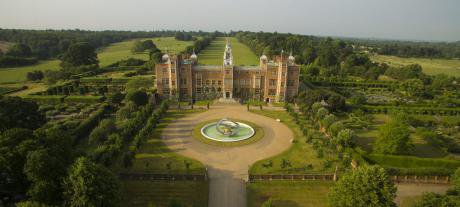
Hatfield House. Imaged used under Fair Use: http://www.hatfield-house.co.uk/. All rights reserved.
Stalbury Trustees, who gave to Better Together, are regular donors to the Conservative party. Their trustees include the Marquess of Salisbury, a former leader of the Conservatives in the House of Lords who is known to have supported a Leave vote. Salisbury has long taken an interest in Northern Irish Unionism, and, in 2010, hosted talks between the Conservatives and Northern Irish Unionist parties, including prominent DUP figures, at his home, Hatfield House, in Hertfordshire.
The Marquess of Salisbury is also a donor to the think tank Open Europe. As openDemocracy has previously revealed, one Open Europe former staff member, Christopher Howarth, is now responsible for the European Research Group – the secretive pro-Brexit MP group which received funding from the Constitutional Research Council when it was chaired by the now Brexit minister, Steve Baker. Another former Open Europe staffer, Raoul Ruparel, now works as a Special Adviser in the Department for Exiting the EU alongside Steve Baker, the former ERG chair.
'No one involved with Stalbury is aware of the specific donation which you mention.'
openDemocracy wrote to Mr Ulric David Barnett, who is secretary of the trust (and lists his profession as “gentleman”). We received a phone call from the mailroom of a legal firm named Forsters, in Mayfair. The address belongs to them, and they initially claimed they knew no one of that name. However, we eventually managed to establish that the trust is, in fact, a client of the firm. After emailing and telephoning the relevant lawyer, we finally received this statement:
“I can tell you that Stalbury has made no donation to the Constitutional Research Council, nor, directly or indirectly, to the Democratic Unionist Party and no one involved with Stalbury is aware of the specific donation which you mention.”
The distillers William Grant and Sons, who produce whiskies including Glenfiddich and Balvenie, donated £135,000 to Better Together, and £25,000 each to the separate pro-Union campaigns “Vote No Borders”, run by the businessman Malcolm Offord, and £25,000 to the campaign run by the previously mentioned Angus MacDonald. After chasing up our letters to them, we received a phone call from Jack Irvine, CEO of Media House International, who told us that he had arranged the Better Together donation, and that “I can assure you there was no connection” between the company and the Constitutional Research Council or the DUP.
The Vestey family
There is one major Unionist donor who has not responded to our repeated attempts to contact him.
The Vestey family are heirs to a vast meat processing fortune, and one of their firms, Western United Investment Management Ltd, gave £40,000 to Better Together. Lord Samuel Vestey is Master of the Horse in the Royal household, and perhaps best known in the UK for the ‘horse meat scandal’, in which his firm supplied horse meat, labelled as beef, to a number of major outlets in 2013. In Australia, he is notorious for the more serious allegation that he used Aboriginal people as “virtual slaves”, leading to the iconic “Wave Hill Walk Off” in 1966 and remembered in the Australian protest song, “From little things, big things grow”. Both Vestey and his father served in the Scots Guards.
We have been unable to establish whether Lord Vestey took a firm public position on the EU referendum, but in an interview with Farmers’ Weekly in April this year he talked about how difficult Brexit would be for farmers, and worried about the shock to British voters as a result of what he called a “divorce settlement” – not language traditionally associated with Leave supporters.
The Vesteys have not responded to our repeated attempts to contact them.
Henry Angest and Arbuthnot Latham
There is one major donor to the Unionist cause in 2014 who is known to have supported Brexit, and who has refused to deny involvement in the DUP donation.
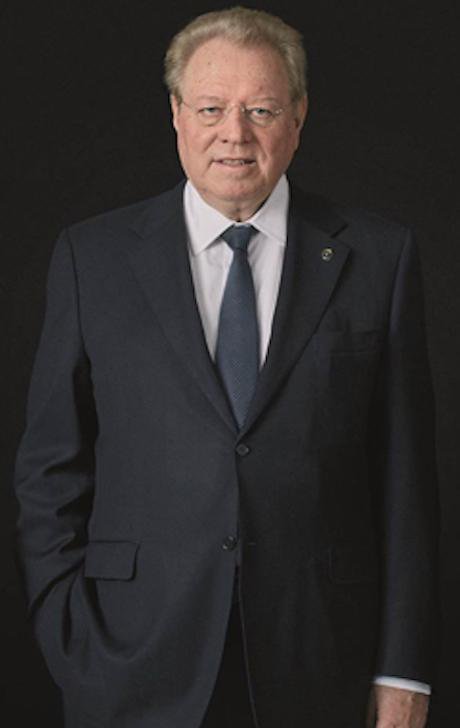
Sir Henry Angest, Chairman and Chief Executive of Arbuthnot Banking Group PLC. Image used under Fair Use: Arbuthnot Banking Group PLC. All rights reserved.
Henry Angest is a Swiss-born banker with an estate in Bridge of Cally, Perthshire. He is chairman and chief executive of the private bank Arbuthnot Latham, owner of the firm Flowidea, and a former treasurer of the Conservative party. He has given over £1.9 million to the Conservative party and made headlines when he was given a knighthood by David Cameron, causing what the Daily Mail called a “cash for titles storm”. He made headlines again when, in 2013, it was revealed that Secure Trust Bank plc, of which he was chair, owned the controversial high-cost loans company Everyday Loans, which was reported to charge interest at an average of 74.8% APR. His bank sold the company in April 2016.
Angest’s firm Flowidea gave £100,000 to Better Together in 2014, and £10,000 to the “North East says No” campaign, against devolution to the North East of England, in 2004. His Arbuthnot Banking Group gave £20,000 to the Vote No campaign in the referendum on the Alternative Vote in 2011. In 2016 alone, Arbuthnott gave £68,500 to the Conservative party, Flowidea gave £185,000 and Angest himself gave £2,000 to the Perth and Kinross Conservatives.
Angest publicly backed Brexit, and, we are told, has long been involved in the Eurosceptic movement. Despite being a prolific donor to the causes he believes in, neither he, nor Flowidea, nor Arbuthnot, nor any of the 22 companies he is currently or has ever been a director of, are listed with the Electoral Commission as having registered any donations to any of the Leave campaigns in Great Britain.
However, investigations by The Observer in 2010 showed that he had given funds in 2006 to the Freedom Association – a right-wing group which has a number of ties to the Constitutional Research Council, through which the DUP donation was channelled. Steve Baker, the current Brexit minister, was a member of the Freedom Association until “around 2013”, the organisation told openDemocracy. Baker took a donation from the CRC in December 2016 for his work with the European Research Group. As openDemocracy has previously revealed, Richard Cook, CRC chair, has spoken at Freedom Association events, and was the Scottish representative of the Campaign Against Political Correctness – an organisation with very close links to the Freedom Association. In 2007, the two key DUP MPs, Jeffrey Donaldson and Sammy Wilson, were involved in a Freedom Association ‘fact-finding mission’ to Northern Ireland. Donaldson was the DUP’s Brexit campaign manager.
There is one major donor to the Unionist cause in 2014 who is known to have supported Brexit, and who has refused to deny involvement in the DUP donation.
Angest, like the Marquess of Salisbury, has also previously funded the group Open Europe, whose former staff members (as mentioned above) include Christopher Howarth, who now runs the CRC-funded European Research Group, and Raoul Ruparel, now a special adviser in the Department for Exiting the EU.
Finally, Mr Angest has also been a donor to the controversial organisation Atlantic Bridge, which brings together the British and the American neo-Conservative right and whose UK director was listed in 2009 as the Scottish businessman Adam Werritty, whose links to Liam Fox caused the latter to resign in disgrace as defence secretary in 2011.
Angest’s office eventually responded to our attempts to contact him, saying that they “have no comment on this matter”. We informed him that he was the only known Brexit-backer in our survey not to distance themselves from this donation, and asked again if he wanted to comment. His office didn’t reply.
We have no evidence to suggest that Henry Angest is the source of the DUP donation, and he is welcome to contact us to clarify the matter.
Read more
Get our weekly email
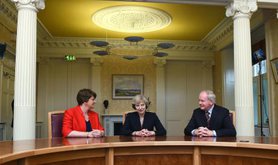

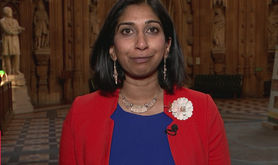
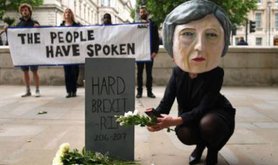
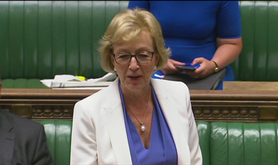
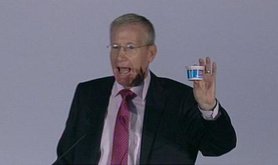
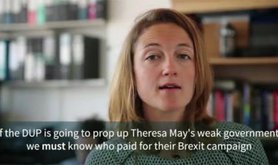
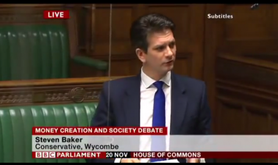

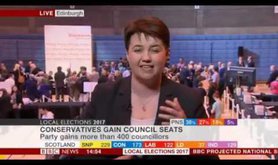
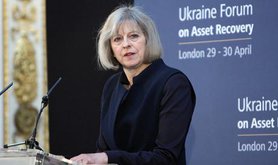
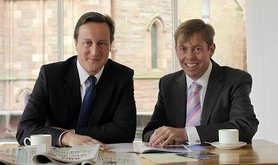
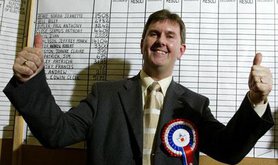
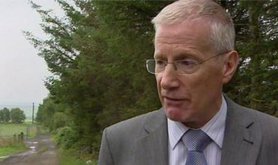

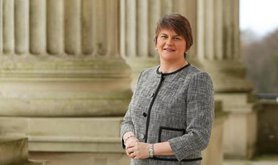

Comments
We encourage anyone to comment, please consult the oD commenting guidelines if you have any questions.